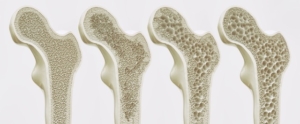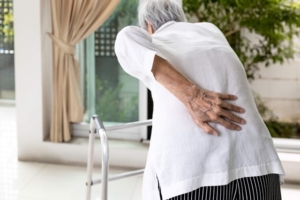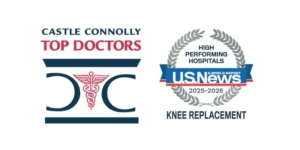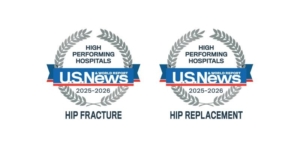What You Can Do to Control Age-Related Bone Loss
The human body is amazing in its complexity, constantly changing as we travel through the bumps and bruises of life. From birth through adulthood and old age, each system in our body is in a continuous state of change, adapting to the impacts of our environment as well as the changes that inevitably happen within us as we get older.
Bone health is very important for your body, and while you may not be aware of it, your body is constantly breaking down old bone tissue and making new bone tissue. It is a dynamic process that continues throughout your life, making more new bone when you’re young and growing and generally reaching your peak bone mass in your 30s. Bone mass refers to the amount of calcium and other minerals in your bones and is an indicator of your bone health and strength. Low bone mass is an indicator of your risk of fracture.
Progression of Osteoporosis

Images above are of an upper femur, the femoral neck and femoral head. The femur on the far left has dense healthy appearing cancellous or trabecular bone which fill its interior. As the images progress to the right, the femur’s internal structure becomes less and less dense as the condition of osteoporosis progresses. Although the osteoporotic bone is normal bone with normal healing ability, because there is so much less of it, the femur is more vulnerable to fracture. The outer part of the femur which defines it’s shape is made up of cortical bone. While these images don’t show it, the outer cortical bone also gets thinner as osteoporosis progresses.
At any age, it makes sense to take the steps that will assure strong bones, minimize falls and preserve mobility. Loss of bone density makes you vulnerable to falls, fractures and conditions like osteoporosis. While osteoporosis in and of itself is not fatal, it increases the risk of serious fractures, complications and injuries which can be life-threatening. You might not be able to maintain the bone density of your younger days, but there’s a good chance that you can maintain good bone health with a regimen of bone-healthy nutrition, adequate vitamin D, calcium and weight-bearing exercise known to help build strong bones. If this holistic approach does not work for you, sometimes a pharmaceutical approach may be the way for you to address age-related changes to your bones.

What can you do to keep your bones as strong and healthy as possible throughout your life? Here are three good places to start:
- Do some form of exercise every day, especially weight-bearing exercises that are known to support bone density. Taking a walk every day, playing pickleball or any other physical activity you enjoy can help build stronger bones. Lifting weights can be particularly effective for stimulating bone growth. Staying active is a prescription for bone health.
- Make sure there’s enough calcium and Vitamin D in your diet. Do some basic research on which foods are rich in calcium and Vitamin D and include plenty of those foods in your daily diet. Low calcium and Vitamin D levels are associated with low bone density. Foods rich in calcium and Vitamin D include dairy, leafy greens and sardines with bones. The recommended daily allowance (RDA) for calcium and vitamin D varies based on age, gender and other factors. For most adults aged 19-50, the RDA is 1,000 mg of calcium and 600 IU of vitamin D. For older adults, the RDA for calcium may increase to 1,200 mg, and the RDA for vitamin D may increase to 800 IU. If you’re having trouble getting enough calcium or Vitamin D, consider taking a supplement as well.
- Don’t smoke at all and drink in moderation. Women should have no more than one alcoholic beverage per day and men should limit their consumption to two drinks. Smoking and consuming too much alcohol have been shown to have a negative impact on bone health.
With those three simple steps, you should be on your way to protecting your bone density, even later in life. If you’re over the age of 50 or have risk factors for osteopenia or osteoporosis, speak to your doctor about getting a bone density test, if you have not already done so, which will provide important information about your bone health. Armed with that information, it is never too late to make simple modifications to your lifestyle that will deliver great benefits for healthy bones.
If, however, you are experiencing symptoms that seem to be coming from your hip or knee, consider scheduling a consultation with Dr. William Leone at the Leone Center for Orthopedic Care at Holy Cross Health in Fort Lauderdale. Dr. Leone is a leader in the field of hip and knee replacement, attracting patients from around the nation and the world. He is renowned for his surgical expertise while providing the highest level of attentive, personalized care in a warm and welcoming environment focused on hip and knee replacement surgery. To schedule an appointment, please call Dr. Leone at 954-489-4575 or visit holycrossleonecenter.com.





